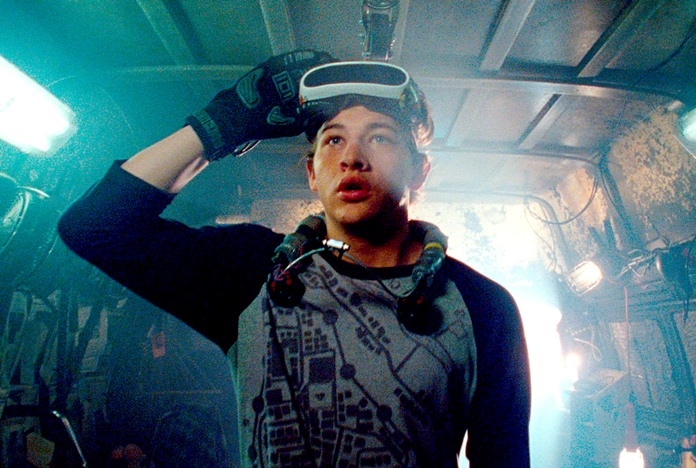
Los Angeles (AP) – “Why can’t we go backward for once?” wonders the protagonist of “Ready Player One” shortly before gunning his “Back to the Future” DeLorean in reverse. “Really put the pedal to the metal.”
 Pressing rewind is, if anything, an understandable desire these days. But in today’s reboot, remake-mad movies, it’s not exactly swimming against the tide. Yet Steven Spielberg’s “Ready Player One,” a rollicking virtual-world geekfest flooded by ’80s ephemera, doesn’t just want to wade back into the past. It wants to race into it at full throttle. For those who get their fix through pop nostalgia, “Ready Player One” is — for better or worse — an indulgent, dizzying overdose.
Pressing rewind is, if anything, an understandable desire these days. But in today’s reboot, remake-mad movies, it’s not exactly swimming against the tide. Yet Steven Spielberg’s “Ready Player One,” a rollicking virtual-world geekfest flooded by ’80s ephemera, doesn’t just want to wade back into the past. It wants to race into it at full throttle. For those who get their fix through pop nostalgia, “Ready Player One” is — for better or worse — an indulgent, dizzying overdose.
In a dystopian 2045 where the world looks mostly like a trash heap, teenager Wade Watts (Tye Sheridan) lives in “The Stacks” — not aisles of books but towering piles of mobile homes — in Columbus, Ohio, with his aunt. “These days,” he narrates, “reality’s a bummer.” With bleakness all around, seemingly everyone is addicted to strapping on a headset and entering the virtual-reality landscape of the OASIS. There, an individual can transform into a digital avatar — live-action or animated, human or extraterrestrial, Sonny or Cher — and do basically anything. Your imagination is your only limit. You can even, we’re told, climb Mt. Everest with Batman! Presumably the thin air would make him less grumpy.
It’s been five years since the death of OASIS creator James Halliday (Mark Rylance), a fizzy-haired Steve Jobs-meets-Willy Wonka nerd deity who left behind a trio of Easter Eggs — hidden clues — in his game. The first one to find the keys and follow them to the end will win the rights to the trillion-dollar company. Wade, who goes by Parzival inside OASIS, is among the competitors still trying to crack the first challenge — a blistering melee through New York City streets where racers must evade, among other things, King Kong and the T-Rex from “Jurassic Park.”
At the film’s SXSW premiere, Spielberg introduced “Ready Player One,” based on Ernest Cline’s 2011 best-seller, as a “movie,” not a “film.” Spielberg, too, is here turning back the clock — just four months after releasing his well-timed ode to the freedom of the press, “The Post” — with a thrill-ride spectacle that harkens back to his pre-”Schindler’s List” days and the more popcorn-friendly flights of movie magic that Spielberg conjured before focusing on more “serious” tales.
The funny, sometimes awkward irony of “Ready Player One” is that Spielberg isn’t just making a movie like his old movies; he’s making a movie awash with his old movies. Sounding almost embarrassed, Spielberg — who initially thought a younger director ought to direct Cline and Zak Penn’s script — has said he stripped out many of his own references from the screenplay.
But the universe of “Ready Player One” remains a loving, fanboy homage to the escapist entertainments Spielberg did more than anyone to create. “Ready Player One” could conceivably be titled “Spielberg: The Remix.” Watching it is a little like seeing him sit in with a Spielberg cover band — a band that’s, like, totally stoked to have the master in their midst.
It’s also an opportunity for one of cinema’s most absurdly skilled and most insanely popular directors to reckon with both his blockbuster legacy and the more digitally versed generations of fantasy-seekers that have followed him. In the OASIS, there are solo players called “gunters” like Parzival and his VR-crush Art3mis (Olivia Cooke), who believe deeply in the game and its maker. And there are companies, specifically one called Innovative Online Industries led by a slick suit named Nolan Sorrento (Ben Mendelsohn), who sends armies of players into battle in hopes of capturing the lucrative company and — in the most sinister of anti-nerd plots — open up OASIS to advertising.
When it’s not careening through ’80s references from Tootsie Roll Pop commercials to Buckaroo Banzai, “Ready Player One” is an Internet parable. There’s mention of prior “bandwidth riots” ahead of this battle over keeping OASIS an open playground to all. “Ready Player One” is both game and war, the stakes of which are occasionally lessened by the fact that it’s a land of make believe. Much of “Ready Player One” also promotes a tiresome gamer culture where “real” fanboys outrank “haters,” geeks vie with suits, and tech wizards are slavishly worshipped. In between the book and the movie, Gamergate exposed the toxicity of the video-game culture lionized here.
As eye-popping as is the kaleidoscopic OASIS — a shinier, bigger-budget, less funny pop-culture soup than the one stirred in “The Lego Movie” — “Ready Player One” is best when it keeps a foot in to the real world. That’s clearly where Spielberg’s heart is, and it’s where, you can feel, he longs to lead his film. (Sorry, “movie.”)
Still, Spielberg shows that he’s just as capable as he ever was in making a rip-roaring spectacle. The momentum is headlong, the visual fireworks are brilliant and despite all the reality-flipping, every scene is perfectly staged. For a backward-looking movie, it’s incredibly forward-moving. Spielberg makes this stuff look easier, and register more clearly, than anyone else in blockbuster-making.
But if choosing between vintage Spielberg and meta Spielberg, I still — not to sound too fanboy-ish about it — prefer the genuine article.
“Ready Player One,” a Warner Bros. release, is rated PG-13 by the Motion Picture Association of America for “sequences of sci-fi action violence, bloody images, some suggestive material, partial nudity and language.” Running time: 140 minutes. Three stars out of four.





